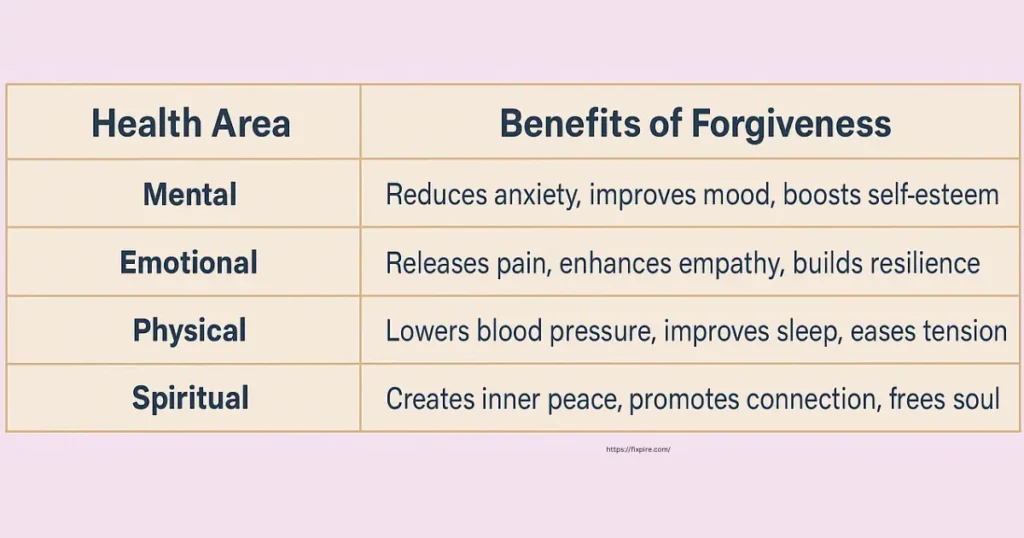Forgiveness is powerful. It’s not just a spiritual or moral ideal—it’s also a healing tool that can improve your mind and body. Research now shows that practicing forgiveness may actually improve your sleep quality and lower your blood pressure. Forgiveness Improve Sleep and Blood Pressure—this is more than just a theory; it’s backed by science and personal transformation. Yes, you read that right. Letting go of past resentment doesn’t just feel good emotionally—it supports real physiological changes that can help you rest better and protect your heart.

Why Holding Onto Grudges Hurts More Than You Think
We’ve all been there. Someone hurts us, betrays our trust, or says something cruel—and we replay it over and over in our heads. This constant emotional replay doesn’t just impact your mood—it can also disrupt your sleep and overall well-being. It can lead to long-term stress, increase cortisol levels (the body’s stress hormone), and cause sleep disturbances.
When the mind is stuck in a cycle of resentment or revenge, it triggers your fight-or-flight response, even if you’re lying still in bed. Over time, this can lead to increased blood pressure, restlessness at night, and chronic fatigue.
That’s where forgiveness comes in as a powerful tool for healing.
What Is Forgiveness, Really?
Forgiveness isn’t about approving harmful behavior. It’s about making the choice to let go of its grip on you. Forgiving doesn’t mean you condone what happened—it means you’re choosing peace over pain. You are simply deciding that it no longer has power over your peace of mind.
It’s an intentional decision to stop carrying emotional pain. And that single decision can transform your mental and physical health in powerful ways.
The Science Behind Forgiveness and Sleep Quality
You might be surprised at how directly forgiveness and sleep quality are linked. According to a study published in the journal Psychology & Health, individuals who regularly practice forgiveness report better sleep, lower levels of fatigue, and improved life satisfaction.
Why? Because forgiveness reduces rumination—the repetitive negative thinking that often keeps us awake.
Forgiveness Helps You Relax
Letting go of grudges can help your brain and body shift out of hyper-alert mode. As stress levels drop, your parasympathetic nervous system becomes more active, helping your body relax and prepare for restful sleep.
Fewer Nighttime Wakeups
People who choose to forgive often sleep more soundly, with fewer nighttime awakenings. Their minds are quieter, and their hearts less heavy. Forgiveness clears the emotional clutter that disrupts healthy sleep cycles.
Can Forgiveness Lower Blood Pressure? Yes, and Here’s the Proof
You might be asking: Can forgiveness lower blood pressure? The answer is a strong yes. In fact, research shows that holding onto resentment may elevate both systolic and diastolic blood pressure readings.
A landmark study from the University of Wisconsin found that participants who practiced forgiveness had significantly lower blood pressure compared to those who didn’t. The reason? Forgiveness triggers the brain’s calming responses, reducing stress hormones that might otherwise constrict blood vessels and put extra pressure on the heart.
How It Works in the Body:
- Reduces stress response
- Lowers heart rate
- Decreases blood vessel tension
- Supports healthy circulation
When you forgive, you’re not only freeing your mind—you’re giving your heart and blood vessels a much-needed break.
The Mental Health Benefits of Forgiveness
The mental health benefits of forgiveness go hand in hand with physical wellness. Studies have linked forgiveness to lower levels of depression, anxiety, and even post-traumatic stress.
Here’s why it works:
1. It Releases Emotional Burdens
Grudges are heavy. When you forgive, it’s like setting down a backpack full of bricks—you instantly feel lighter, more at ease, and emotionally at peace.
2. It Improves Emotional Regulation
Forgiveness enhances emotional control. It helps you respond rather than react, creating a stronger sense of inner balance and calm.
3. It Boosts Your Mood Naturally
Letting go of past hurts makes room for more positive emotions—like joy, gratitude, and hope. These positive states boost dopamine and serotonin levels, which are essential for mood and sleep regulation.
Forgiveness for Better Sleep: Real-Life Tips
If you’re seeking forgiveness for better sleep, you don’t need to wait for a big dramatic moment. Even small acts of letting go can help improve your rest. Here are practical, real-life strategies:
1. Write a Forgiveness Letter (But Don’t Send It)
Put your feelings into words. Describe what happened, how it hurt, and why you’re choosing to forgive. This clears emotional clutter before bed.
2. Practice Mindful Breathing
Before sleep, focus on your breath. Inhale calm, exhale anger. Let each breath be an act of emotional release.
3. Use Forgiveness Affirmations
Try repeating these aloud or in your mind:
- “I release what no longer serves me.”
- “I choose peace over resentment.”
- “I forgive to heal myself.”
4. Visualize Letting Go
Imagine placing your emotional pain into a balloon and letting it float away. This sends a powerful message to your subconscious that it’s finally safe to relax and drift into restful sleep.
5. Forgive Yourself First
Self-forgiveness is just as powerful. Let go of past regrets or guilt. You deserve peace, too.
How Forgiveness Improves Health Holistically
You’ve seen how forgiveness improves sleep and blood pressure, but let’s look at the big picture. When you make forgiveness a lifestyle, your entire well-being transforms.
Here’s a full-spectrum view of how forgiveness improves health:

The Ripple Effect: Forgive to Thrive
Forgiveness doesn’t just help you—it benefits your relationships, your family, your community. People who practice forgiveness often enjoy stronger marriages, deeper friendships, and more effective communication skills.
This emotional intelligence leads to less conflict, more compassion, and stronger social support—all factors that protect your heart, both physically and metaphorically.
Conclusion: Start Small, Forgive Daily
You don’t need to heal everything at once. Begin with the small stuff—the rude driver, a missed call, or a sharp comment. Every act of forgiveness strengthens your emotional resilience and retrains your brain to choose calm over chaos. When you feel restless at night or notice rising stress, pause and ask: What am I still holding onto?
Because yes—forgiveness can improve sleep and blood pressure. And it may be the most loving gift you give yourself.
Start your healing journey today—choose forgiveness, and feel the difference in your body, mind, and heart.











